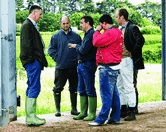Dairy Farmer of the Year Finalists – Lyndon Edwards

Lyndon Edwards – Severndale Farm, near Chepstow, Monmouthshire
Lyndon Edwards may be an organic producer, but he is as far as you can get from the beard-and-sandals image that he says some still associate with the movement.
For starters, a new-model Land Rover Discovery outside the farmhouse shows that this is a man who is not afraid to enjoy and take advantage of the latest technology.
But that is not to say his organic principles and credentials don’t run deep, Lyndon has not just jumped onto the organic bandwagon hoping to take advantage of the public’s growing desire for chemical-free food.
Thrust into the deep end of dairying at just 16 with no formal qualifications when his father had a heart attack, Lyndon says the farm’s abundant clover leys had always suggested to him that it might suit organic production.
This feeling was cemented following a visit to New Zealand on a Waitangi scholarship in 1998 when an organic price premium didn’t exist. He says he liked the principle and he liked the system.
Not a man to procrastinate once his mind is made up, Lyndon had Severndale Farm fully organic by 2000 and, despite a sharp fall in organic milk prices during a period of oversupply, it has been growing ever since. Cow numbers have increased by 85% and the farm has taken on an extra 255 acres. Profit from milk this year should be about £70,000.
Today, visitors to the farm, and there are many, conventional as well as organic, will find cows producing almost 8000 litres of milk a year driven by technical innovations that would put many conventional dairy set-ups to shame. He says he always hopes everybody who visits will learn something.
Lyndon has an eye for detail, and this has helped him maximise the return from his cows. When, for example, he decided to build a new cubicle building for the herd simply choosing the cheapest or most popular system was not an option.
Instead, six different combinations of mats, barriers and bedding were constructed after visits to other units and compared for cow comfort and ease of use.
The plan certainly paid dividends because the cows “chose” a different system to the one initially favoured by Lyndon and
| Facts Box |
|---|
| Farm size: 560 acres No Cows: 210 pedigree Holstein Friesian and Brown Swiss Dairy System: Organic TMR and grazing Milk Buyer: OMSCo |
Humid conditions from the farm’s riverside location meant calf mortality from pneumonia was always a problem. After months of research an innovative, well-ventilated calf shed using recycled plastic slats over an easy-to-clean concrete waste passage cut cases to zero.
Close attention is also paid to the forage crops, particularly clover leys and maize, that are grown on the farm and Lyndon tries to cut the use of costly bought-in organic concentrates by growing as much as he can – this year he’s experimenting with lupins – of his own.
But it’s not just the cows that get a say in how the business is run. Lyndon also believes strongly that his team of three full-time staff kitted out in cosy jackets emblazoned with the herd’s logo should be involved, too. No changes are made to the way the farm is run without staff agreement.
Despite his obvious devotion to organic milk production – his eyes light up and arms start to wave when talking about his cows – Lyndon has been critical in the past of how the market has been run, including the management of OMSCo, the organic milk co-operative he supplies.
However, rather than simply complain and leave others to solve the issues he joined the board of the co-op where he has applied the same enthusiasm and creative problem-solving techniques that he uses on his own farm.
 And it’s not just organic dairy farmers who benefit from his seemingly endless energy. Lyndon is now chairman of the Royal Association of British Dairy Farmers and has also chaired the Chepstow agricultural society and been a parish councillor.
And it’s not just organic dairy farmers who benefit from his seemingly endless energy. Lyndon is now chairman of the Royal Association of British Dairy Farmers and has also chaired the Chepstow agricultural society and been a parish councillor.
Lyndon’s says he finds it galling some people assume he’s not farming properly just because he’s organic. But he’s proving them wrong in the best way of all by building up a profitable and technically innovative business that he plans to keep on growing and pass to his children.
| What the judges liked |
|---|
|
